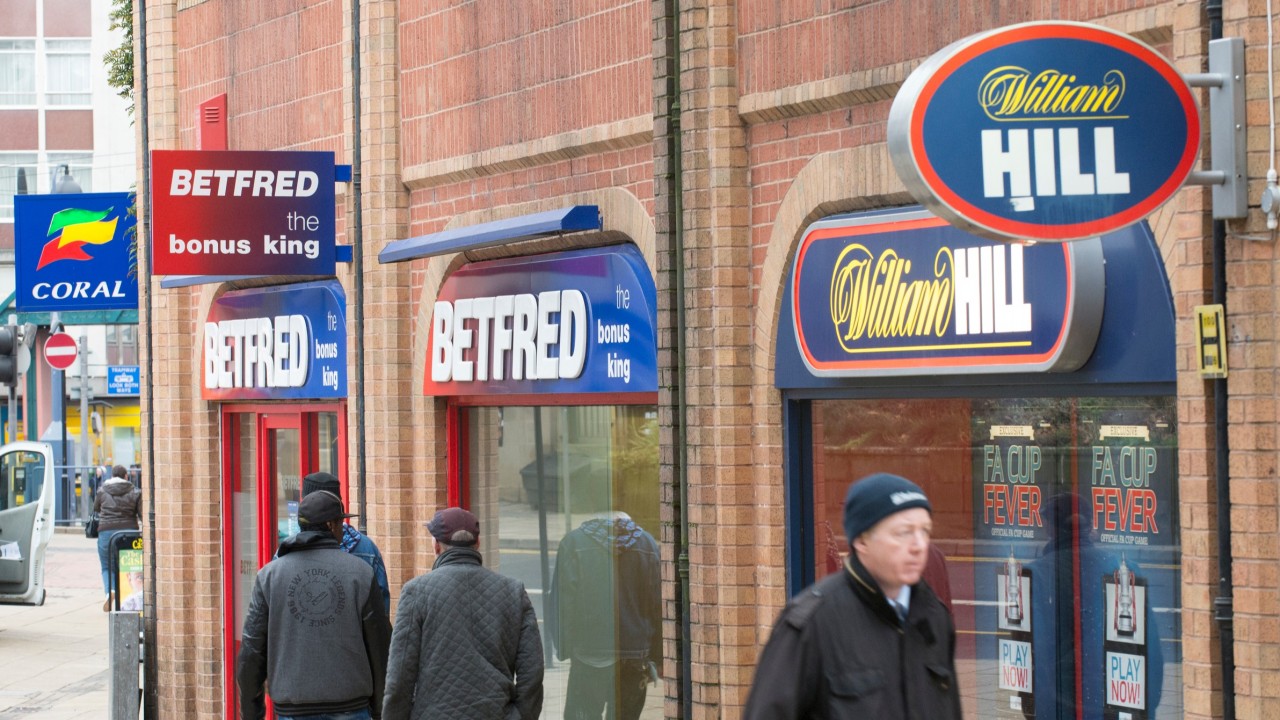New Fobt Limits

Even in amongst the Brexit fiasco, the government’s decision-making as far as the FOBT maximum stake is concerned has been chaotic, badly managed and a damning indictment of this government’s lack of courage in its convictions.
Bookmakers set to test new FOBT limits next month By Nathan Joyes UK bookmakers have opted to trial the new £2 ($2.56) stake limit for fixed-odds betting terminals (FOBT) in betting shops across Birmingham next month, in preparation for the upcoming law change on 1 April. What might happen is that many more players now go online. If they aren’t happy with the new FOBT limits they could decide to switch. The bigger betting limits and added convenience make this an easy move to make. I can’t see any clear figures for online casinos yet for this year. A fecal occult blood test (FOBT) is a non-invasive way to screen your feces, or stools, for blood that's not visible to the naked eye, known as occult blood. If there's blood in your stool, this indicates that there's likely bleeding going on somewhere in your digestive tract, which can be a symptom of several conditions, as well as an early. If a home fecal occult blood test detects blood in the stool it is recommended to see a health professional to arrange further testing. Colorectal cancer screening. An estimated 1–5% of large tested populations have a positive fecal occult blood test. citation needed Of those, about 2–10% have cancer, while 20–30% have adenomas.
To cut a long story short (you can read a more detailed version of events below), the Tories have gone back on their plans to delay the introduction of the new legislation until October 2019, meaning that the £2 stake will be brought into power as of April 2019.

And in a further blow to bookies and operators, the government’s increase in remote gaming duty from 16% to 21% – as announced in the Autumn Budget – will also go ahead as planned.
It’s the latest chapter in an ongoing saga of incompetence, and another example of how the government – and previous establishments have also been guilty of this – really doesn’t know how to treat betting firms in the UK.
Are they an evil that needs to be clamped down on, or a source of outstanding tax revenue?
Here’s a look at how the sorry FOBT tale has unfolded.
In the Beginning
For the uninitiated, FOBT stands for Fixed Odds Betting Terminals, and they are the little computer-type things you see in many bookmakers’ shops.
Punters can play a range of casino-style games upon them, such as roulette, and they are essentially a digital sibling of the old-fashioned slot machines you used to see in various places.
The problem with FOBTs, from a regulatory perspective, is that they didn’t have any real limits on spending, so punters could theoretically wager thousands of pounds on a single session – indeed, they could stake as much as £100 every 20 seconds should they wish.
This naturally, has led to countless issues on an individual and societal level, as addictive behaviour spiralled out of control for some. The bookies, who pocket an average of £50,000 a year per machine, were profiting heavily.
Since the Gambling Act was introduced in 2005, the number of FOBT machines on the UK high street has nearly doubled to 35,000, and key critics of the terminals decided that enough was enough.
Time for Action
In October 2016, the government conducted their triennial review of gaming machines in the UK.
They asked the UK Gambling Commission to present their own findings, and in the spring of 2018 the results were released into the public domain.

These suggested that the maximum stake on FOBTs should be reduced from £100 to £2, and that ‘tracked play’ should become mandatory. This would include money and time limits, which would automatically end sessions at a particular point.
“We’ve put consumers at the heart of our advice – advice which is based on the best available evidence and is focused on reducing the risk of gambling-related harm,” said the Commission’s chief executive, Neil McArthur.
“In our judgement, a stake cut for Fixed Odds Betting Terminals alone doesn’t go far enough to protect vulnerable people. That is why we have recommended a stake cut plus a comprehensive package of other measures to protect consumers.”
Latest news: our advice to @DCMShttps://t.co/pmdm3c4QX3pic.twitter.com/o5auhCM9pR
— Gambling Commission (@GamRegGB) 19 March 2018
The recommendations were accepted by the government, with the Minister of Sport, Tracey Crouch, and Matt Hancock, Secretary of State for the Department for Digital, Culture, Media and Sport, confirming that the £2 stake would be introduced in the next financial year (April 2019).
The decision was met with an outcry by key industry figures, who stated that redundancies would be inevitable as profit margins were slashed.
In his Autumn Budget, the chancellor, Phillip Hammond, confirmed that the new FOBT regulation would be introduced, however its implementation would be delayed until October 2019 so that bookmakers could get their houses in order and make necessary adjustments to their business model.
This was met with derision once more from critics, with the additional six-month trading period set to hand a windfall of some £900m to the industry. Crouch resigned, and trouble began brewing in the Houses of Parliament.
Rebellion
New Fobt Limits Rules
A committee of more than 100 MPs, including Theresa May’s nemesis Boris Johnson, Jacob Rees-Mogg and David Davis, lent their names to an amendment to the government’s FOBT bill that would bring forward the rule changes to April next year.
A number of key opposition officials also said that they would support the amendment, with the upshot being that the government would likely lose the vote on the issue in the House of Commons – that would have been the first time in 40 years that the rulers would have lost on their own Budget bill.
Nevertheless, the Treasury had said that they would be resisting pressure to fast forward the implementation of the bill.
About Turn
At Prime Minister’s Questions on Wednesday, Iain Duncan-Smith – an occasional Theresa May supporter but vocal critic of FOBTs, raised the issue of the proposed rebel amendment.
And May acquiesced; the government would perform the ultimate volte-face and bring forward the £2 stake to April.
The culture secretary, Jeremy Wright, confirmed the move in a statement on the afternoon of November 16:
“The government has been clear that protecting vulnerable people is the prime concern, but that as a responsible government it is also right to take the needs of those employed by the gambling industry into account and provide time for an orderly transition,” the statement read.

“Parliament has, however, been clear that they want this change to be made sooner. The government has listened and will now implement the reduction in April 2019.”
Wright also confirmed that the increase in gaming duty would also still go ahead as planned in April.
The timing of the decision was highly contentious. It came just hours before the Prime Minister presented the draft Brexit bill to ministers in the Commons, and cynics might suggest that the FOBT acceleration was a carrot used to sweeten dissenters of the ‘soft’ divorce plan. That was a notion not lost on many in political circles.
The shadow culture minister, Tom Watson, stuck the boot in. “This climbdown shows the disastrous political judgment of Jeremy Wright and Philip Hammond.
“It’s very sad that it took an honourable resignation of a good minister and a cross-party revolt to achieve the blindingly obvious and necessary reforms to FOBTs.
“Whilst this is a personal humiliation for Jeremy Wright, this is a very good day for the many thousands of people whose families and communities are blighted by gambling addiction.”
The Bookies’ View
The government’s figures suggest that the increase in remote gaming duty will ultimately lead to an extra £255m being raised for their coffers year on year, which would make up for the shortfall from FOBT revenue of £245m.
But the societal damage caused could well be wide-ranging, according to various bookmakers’ groups.
The Association of British Bookmakers believes firms could make as many as 21,000 staff redundant as a result of 4,500 shop closures, and that if the later FOBT date of October had been agreed many of these would have been saved.
“Betting shops will comply with the timing that the government sets for the £2 stake implementation,” their spokesman remarked rather dryly.
Clive Hawkswood, the chief executive of the Remote Gambling Association, was rather more scathing in his verdict. “The change in implementation dates will clearly be a blow for the LBO [licensed betting office] sector, but it is frustrating that no consideration at all seems to have been given to the fact that this also means the online gaming sector could now face an additional tax hit of around £100m, over and above the expected £200m plus a year it had already been saddled with.
“To say we have suffered serious collateral damage would be an understatement.”
The government is to clamp down on the 'social blight' of fixed-odds betting terminals (FOBT) by cutting the maximum amount people can stake on the machines to £2.
Culture Secretary Matt Hancock said ministers had decided to 'take a stand' despite dire warnings from the betting industry- which reacted to the announcement by saying 21,000 people were expected to lose their jobs as a result.
A review by the Gambling Commission in March had recommended a maximum stake of £30 or less for so-called non-slot machines such as roulette - by far the most popular FOBT game - but the government decided to go further.
Users can currently gamble away up to £100 every 20 seconds on the machines, which campaigners say are dangerously addictive and have been dubbed the 'crack cocaine of gambling'.
Mr Hancock said: 'When faced with the choice of halfway measures or doing everything we can to protect vulnerable people, we have chosen to take a stand. These machines are a social blight.'
The government's findings showed that even cutting the stake to £10 would leave problem gamblers 'exposed to losses that would cause them and their families significant harm'.
They showed that high-spending sessions that mounted up to thousands of pounds in losses persisted even at average stakes as low as £5, but there were no such sessions involving average stakes of £2 or below.
More from Business
Sports minister Tracey Crouch said: 'Problem gambling can devastate individuals' lives, families and communities.
'By reducing FOBT stakes to £2 we can help stop extreme losses by those who can least afford it.'
Labour deputy leader Tom Watson said it 'signals the end of the reign of destruction and misery that FOBTs have brought on the lives of gambling addicts and their families and communities for too many years'.
Campaigners for stronger restrictions on the machines also expressed delight.
The Bishop of St Albans, Alan Smith, said: 'Fixed-odds betting terminals are a scourge on high streets that have taken advantage of the vulnerable for too long.'
But the Association of British Bookmakers (ABB) said the decision will have 'far-reaching implications' and would cost the Treasury £1.1bn in lost tax revenue by 2020, as well as £290m in reduced payments on horse racing.

It said: 'We expect over 4,000 shops to close and 21,000 colleagues to lose their jobs.'
Measures announced by the government also included tougher rules for internet gambling, including proposals on age verification limits on consumers' spending.
William Hill said the changes presented a 'tough challenge' and could result in around 900 shops - around 38% of its store estate - becoming loss-making and a 'proportion' at risk of being closed, with gaming net revenues expected to fall by 35-45% and annual operating profits by up to £100m.
Please use Chrome browser for a more accessible video player
New Fobt Limits Definition
Sky News revealed earlier this week that the company had warned ministers that the stake cut could leave it vulnerable to a foreign takeover.
GVC said it was disappointed with the decision which it expects to have a £160m impact on annual earnings in the first full year after the change.
Paddy Power Betfair said it expected a 33% to 43% hit to gaming machine takings, or £35m-£46m on 2017 figures - around 2% of revenue for the total group.
Chief executive Peter Jackson said the announcement was a 'positive development for the long-term sustainability of the industry'.
New Fobt Limits Test
Please use Chrome browser for a more accessible video player
The government said it would need parliamentary approval for is reforms and would engage with the industry to give it 'sufficient time to implement and complete' technological changes required.
The Institute of Economic Affairs (IEA), a free market think-tank, warned of 'unintended consequences' from the changes, with taxpayers having to make up the fall in Treasury income.
New Fobt Limits Vs
It said the move would amount to a ban, with machines being taken out of bookmakers, shops closing, and thousands of jobs being lost - while gamblers would simply move online where there are no limits on stakes or prizes.
Christopher Snowdon, the IEA's head of lifestyle economics, said the decision was the result of a 'moral panic over something that accounts for just 14% of Britain's gambling expenditure'.
He said: 'There has never been any evidence to support this campaign. The government is weak and cowardly to have given into it.'